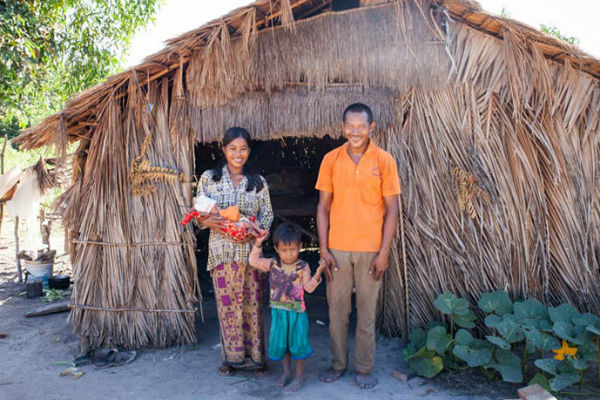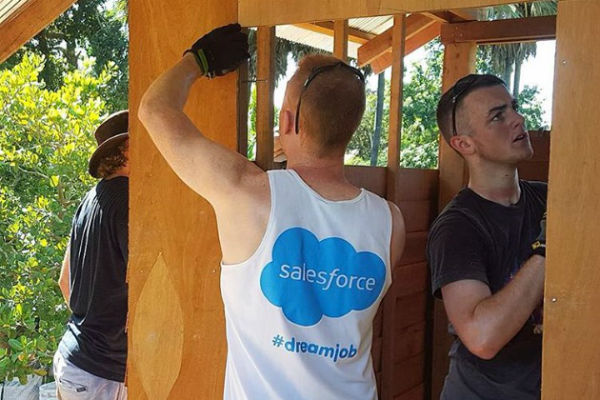
Get your FREE 30-day trial.
Start by selecting a product:
For the past four years, Volunteer Building Cambodia (VBC) has been building Khmer-style wooden houses for Cambodian families in need. Now we’re about to build our 200th house.
Like many Khmer people, I know first-hand what it’s like to be poverty-stricken. I grew up in a poor family in a rural fishing village in Cambodia, with my mum and two older sisters – my father was killed by the Khmer Rouge when I was very young.
During the wet season, our village would flood, so we lived in a floating house made of bamboo. Then, come dry season, we’d move it on-land. The house was very small and in poor condition – it wasn’t anything like the houses VBC builds today.
Getting an education was also difficult. My junior high school was 25km away and my family couldn’t afford a bike, so I used to get a lift on the back of someone else’s bike. At one point, I lived with Buddhist monks in a pagoda near school so I could attend more easily.
These personal experiences inspired me to set up VBC. I know how hard it is for rural Cambodians to break the cycle of poverty and how few job opportunities there are. So I want to do all I can to improve the lives of my fellow Cambodians, aiding in the creation of an equitable future where people can take care of others.
By grade eight, my family could no longer afford my education, so I decided to move to Phnom Penh to work for a construction company, hoping that it would provide me a path out of poverty.
At this job, I paid close attention to the trade, learning as much as possible. I worked my way up the ladder, by taking on various roles, before heading the construction of a four-star hotel in Siem Reap.
I then started managing volunteer builds for another organisation before starting VBC in 2014. Since then, we’ve built many houses, wells, water pumps and toilet facilities for some of Cambodia’s poorest families in the rural areas around Siem Reap, in the north-west of the country.
Around 80% of the Cambodian population lives in rural areas, often on less than the equivalent of US$1 a day. Health problems are common, with 85% lacking access to adequate sanitation and 35% unable to even afford clean water. Houses are generally incredibly fragile structures that have palm frond walls and dirt floors. Many of these homes don’t survive the wet season. Inadequate housing like this can take its toll on a family.
Improving the housing situation is an important step in tackling the poverty that plagues rural Cambodia. With a safe, dry and secure house, people are given hope, they sleep better, they’re less stressed and, overall, healthier, therefore spending less money on medicine. Children are also more likely to go to school, while adults can focus on their work and earn more money.

One of the hardest but most important parts of running VBC is choosing the families to build new houses for. To ensure we help those most in need, we go out and find the families ourselves, targeting communes and villages with high rates of poverty. It’s not an easy process. Our social worker Rorm Monn spends time working with the village and commune leaders, talking to families, and performing thorough assessment and background checks.
An important criteria for us is that the families we select own their own land – outright, free from any loans – so there’s no risk of them losing their new homes to debt collectors or being kicked out in any way.
From day one, Salesforce has been a big supporter of VBC, offering financial support, matching employee donations and regularly sending employees to volunteer. As an NGO, we rely on the help of such volunteers and donors to complete our work.
Over the past four years, Salesforce and its employees have financially contributed more than US$220,000, which we’re incredibly grateful for. This contribution has financed more than the houses we’ve built.
Thanks to Salesforce and its employees, we were able to buy the land where our warehouse and community centre is situated, and finance the build of the warehouse itself, along with the build of two classrooms and a computer room. The funding also contributed to the fit-out of the computer room.
For me, there have been two highly memorable builds with Salesforce volunteers. The first was a volunteer group from Salesforce’s Singapore and Australian offices, who helped build house number seven. This group was determined to complete the house in record time so the family could move in as soon as possible. They worked non-stop, through the rain, to complete it in half the normal time.
And earlier this year, Salesforce’s Senior VP Ulrik Nehammer celebrated a milestone birthday of his not by throwing a big party, but instead, by building 10 houses for Cambodians in need. After raising US$63,000, Ulrik, his wife and 26 of his friends travelled to Cambodia to build 10 houses – each with a toilet and solar kit – in one week.
We normally only complete between one to three houses per week, so this was an epic build for VBC – one that required a lot of preparation to ensure smooth delivery, but the result was absolutely worth it. The donations made by this group were also used to sponsor the purchase of a truck and Ulrik and his wife Andre donated IT to VBC. Ulrik is planning to return again with 15 friends in December to build an additional two houses.

Building the 200th house means a lot for VBC because it means we’ve helped 200 families – that’s around 900 lives that we’ve improved.
Establishing a community centre in 2016 was another big milestone in our journey, as it enables us to make a bigger impact to the broader community, not just the families receiving the homes, and helps strengthen the community living in that area.
The community centre is located about 25km from Siem Reap, in an area of high poverty and limited options for extra education such as English lessons and computer studies. Many of the adults in that area are illiterate or have very limited reading skills. In addition, there are limited job opportunities and high unemployment rates.
So, the community centre provides free education for people in the rural area, namely English lessons and computer classes. It also employs teachers from the village who educate the children on a wide range of subjects such as hygiene, sanitation, health and nutrition, and broader subjects like the earth and environment.
Moving forward, I have big plans to help more people beyond the Siem Riep area, but will take things step-by-step.
VBC has developed and improved a lot since building that first house. We’ve grown from three staff to 15, all of whom we’re helping to develop skills that will improve their lives. Staff development is very important to us, as is creating jobs for local Cambodians.
Our builders, for example, have some basic building knowledge but were trained to build a wooden house and construct from design. Some of them even started off not knowing how to use a tape measure or mix concrete.
We also upskill the entire VBC team, including builders, teachers and office staff, with leadership training, management skills and English lessons – things that add value to their lives and improve their employment opportunities and ability to earn more money.
At VBC, we’re always looking for ways to help Cambodians break the poverty cycle and to become self-sufficient. It’s important we’re giving people the tools and the confidence to help themselves and create something on their own, enabling a more equitable future.
It’s the business of business to change the world. Find out more about Salesforce’s model of integrated corporate philanthropy and take the 1% pledge. You can also give back to VBC by volunteering your time and/or making a financial donation. Find out more.